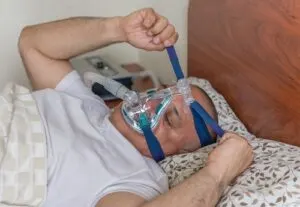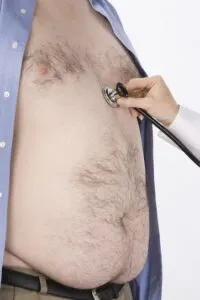 Sleep Apnea is a fairly common sleep disorder that causes interruption to your breathing while you’re sleeping. But is there any connection between this condition and obesity or can can it in fact cause you to gain weight?. Sleep Apnea from obesity is a very real concern for many people the world over and with much of the world overweight, it’s an understandable concern.
Sleep Apnea is a fairly common sleep disorder that causes interruption to your breathing while you’re sleeping. But is there any connection between this condition and obesity or can can it in fact cause you to gain weight?. Sleep Apnea from obesity is a very real concern for many people the world over and with much of the world overweight, it’s an understandable concern.
This article will go over the factors that influence this condition as a result of being obese as well as the vicious cycle that many have discovered which can lead to obesity as a result of sleep deprivation.
What Is Sleep Apnea
Quick Links to Info on this Page:
It’s never a good feeling waking up during the night gasping for air, even when you’re unaware of it happening to you. Especially when you find breathing as a bigger person difficult enough as it is, it can be quite scary.
The breathing interruption results from elevation in upper airway collapsing which leads to recurrent obstruction of the upper airway. All while you’re asleep and have no control of the occurrences. Collapsing of your airways can be worsened by underlying anatomic alterations in the upper airway neuromuscular control.
Obesity Sleep Apnea Connection
Studies show that obesity, especially, central adiposity is the main predisposing factor for sleep apnea. According to research by Wisconsin Sleep cohort, up to 41% obstructive sleep disorder among adults is mainly attributed to obesity. This is why heavier people snore noticeably more.
Because a large percentage of people that suffer from sleep apnea are obese most health professions will recommend losing weight as the ancillary treatment of the obstructive sleep apnea. Studies have proved that weight loss helps to reduce the severity of the Obstructive Sleep Apnea OSA. This is also often a side benefit to undergoing Bariatric surgery as well.
Should You Be Concerned?
Million of Americans are facing obesity problems which starts out at a young age, while over 30 percent are affected by excessive weight problems. While many of us are aware of the health risks associated with obesity, not many recognize sleep apnea as a concern. But as you will find out below how this vicious cycle can ruin lives, you will soon enough understand the dangers of sleep deprivation.
Addressing excessive body weight is not easy without doctor’s support. People realize that excessive weight leads to numerous medical conditions problems. However, many people do not know that has grave impact on their health.
I am one of these people that takes health for granted which is just asking for trouble. While I often deflect these thoughts and tell myself that I will doing something about it one day, that one day may never come. Staying pro active is a tough battle, losing weight is never easy.
Is Excessive Weight The Only Cause Of Sleep Apnea?
Although it is easy to point out that excessive body weight is the main cause of Obstructive Sleep Apnea, there are other courses that includes the following:
- Some children have upper airways that have
oversized organs such as tonsils and tongue when they are born. - Some people features high, narrow arches in the
cavities that can create breathing problem while a sleep. - Miscommunication between the brain the
respiratory system can also lead to obstructive sleep apnea. - Snoring may be a warning sign for OSA.
How Your Body Weight Can Cause Sleep Apnea
Although there are other factors that can lead to sleep apnea, numerous researchers have pointed out that people with excess weight have a greater risk of developing a lifelong sleep apnea.
While this condition can be prevented or cured in young children through excessive weight management and continuous positive airway pressure (CPAP), it is difficult to manage sleep apnea when you’re obese. Especially among the children as their brains aren’t developed enough yet to fully understand the consequences.
Research reveals that obese or overweight people are more likely to have obstructive sleep apnea than people with healthy body weight.
Among the adults the prevalence of obstructive sleep apnea is about 25%, but as high as 45% among the overweight adults.
It has also been shown that men with neck circumference of more than 17 inches and women with circumference greater than 16 inches have higher risk of the sleep apnea condition.
How Obesity Causes Sleep Deprivation
Obstructive Sleep Apnea among the overweight or obese victims is due to the fact that being overweight increases the chances of having excessive fatty tissues throughout the body including the throat.
These fatty tissues can obstruct the airway especially when the patient is a sleep. In some cases when the patient is a sleep, the soft tissues collapse into the airway and pinch-of airflow resulting in apnea.
Men typically gain more weight around the neck region which is why Men tend to snore more than Women. The more neck fat that is present, the more tissues that can vibrate while your sleeping causing you to snore.
Can You Become Obese From Sleep Apnea
What many people don’t realize is that long term sleep deprivation and OSA can in fact cause you to gain weight. While we have covered how being obese can cause sleep apnea, now it’s time to see how this vicious cycle can turn around and actually cause you to become overweight.
Research has also shown that if a sleeping and breathing disorder is not treated, patients can start gaining weight very fast. Most of the time without the person being aware of the reason why they are gaining weight.
Patients who fail to manage sleep apnea condition are likely
to find themselves in vicious cycle that involves the following condition:
- Sleep apnea leads to poor sleep condition that results in poor energy during the day, which in turn results in low healthy activities and exercise during the day leading to even more unhealthy body weight. (Too tired to exercise)
- Poor sleep also contribute to unhealthy sugary food craving that in turn contribute to excess body weight, which can even worsen sleep apnea. (Fast Food outlets thrive on people too tired to cook)
- Therefore, untreated Obstructive Sleep Apnea makes weight loss very difficult, which in turn makes Sleep Apnea treatment even more difficult to treat.
The Vicious Cycle
When you think about it, its not that difficult to understand why many people gain weight due to the connection with sleep apnea. With the amount of energy drinks and iced coffees available these days, the temptation for a sugar and caffeine hit is a no brainer.
Anything to help you gain the energy to go to work, look after the kids, make dinner etc. While its solving one problem, its creating another: In the waist line, or the neck line more specifically for sleep deprivation.
This in turns creates the vicious cycle. Where being deprived of sleep can cause you to gain weight, which as previously discussed can lead to sleep apnea. So how do you escape this vicious cycle?.
Connection Between Sleep Apnea And Obesity:
Sleep Apnea can be managed through a combination of weight loss and CPAP therapy. Before making any bold decisions, you should always consult your Doctor first.
CPAP therapy can help to improve the quality of sleep during the night and improve the energy level during the day. This helps you to gain the energy required to muster up some form of exercise.
The theory is that if you do a lot of exercise during the day resulting in weight loss, in turn helps in management of your sleep apnea condition. CPAP therapy helps to maintain the healthy living style, which help to treat apnea condition as well as reduce pressure settings.
Exercise Is Your Friend
There’s no getting around it. In order to beat Sleep Apnea, I believe exercise and avoiding foods that make you obese are key to success. Studies have shown that it is not easy to treat sleep apnea without managing excess weight. Not impossible, but much harder. In fact, for some patients, weight loss alone can resolve their sleeping problem completely.
Exercising when you’re overweight is not easy, I’ll be the first to admit that. But if you start out small and stay committed, it does get easier. For example I started out slowly walking on a high capacity treadmill as I found it the easiest form of exercise for my size.
Since then I have gradually added other exercise routines into my schedule. While I’m still obese, I have managed to find my way down to the floor on a rowing machine. Back when I started on the treadmill, there was no hope of me ever getting down low to use a rowing machine.
However, if the weight loss can not cure the sleep apnea condition entirely, the loss of weight reduces on the neck making it easier to treat the condition with the CPAP therapy. The more the tissues around the airflow, the more the pressure required to prevent these
tissues from collapsing into the airway.
Does CPAP Help All Obese People
On the other hand CPAP therapy can worsen the condition if there is high pressure in the body. In fact, some obese people abandon CPAP therapy all together due to high pressure, which can lead to decrease in their overall health.
To manage this condition as an obese person, you must lose the excess weight to reduce pressure required to prevent tissues from collapsing into the airflow. Once the weight is reduced, the patient can use CPAP therapy to manage the condition better.
Should You Consult A Doctor?
Obesity and sleep apnea share a number of health risks such as high blood pressure, stroke, heart attack, coronary heart disease, heart failure as well as deterioration of health. Therefore, shedding excess weight does not only help to aid in management of CPAP treatment but also help to prevent other severe health condition that results from excess weight.
Once you notice warning signs of sleep apnea, it is important to see a doctor. It is important to manage the condition early enough to avoid worsening. Moreover, managing excessive weight and sleep apnea may need a tailored solution that depends mainly on the healthy status of an individual.
The doctor will have to perform sleep studies to help diagnose sleep apnea and come up with tailored therapeutic solution that will help to manage your individual condition. The bottom line is that sleep apnea and obesity are very much related. Both can affect your health and they both need attention. So don’t just put it off until another day, act now.

Look into exercising the diaphragm + practicing 3d breathing. The diaphragm atrophies from lack of use when excess weight on it makes it more difficult to lift. If these muscles aren’t used daily the problem spirals downward viciously.
The muscles of respiration often need to be strengthened by learning to breathe. Yes, learning is fundamental. Many, even most, larger people chest breathe: flight or fright – that breathing is meant to induce stress when we need it. Learning to breathe reduces stress when we don’t want it, increases life, health, etc. A pranayama teacher or book can explain. Hoping to link a radio show on topic.
https://www.npr.org/sections/health-shots/2020/05/27/862963172/how-the-lost-art-of-breathing-can-impact-sleep-and-resilience